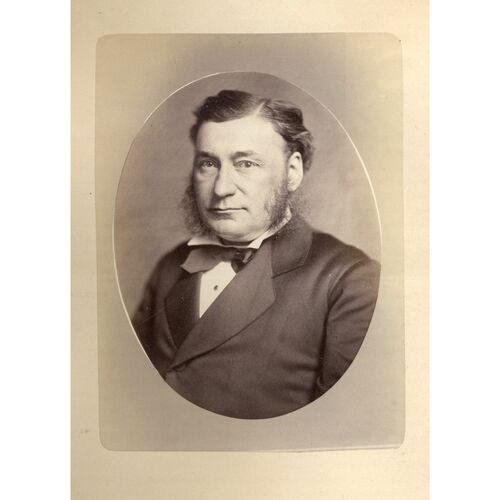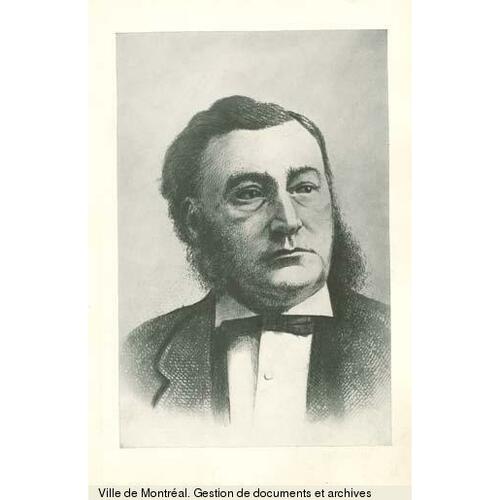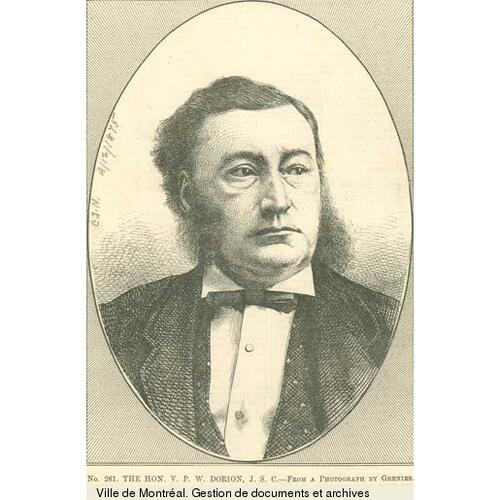DORION, VINCISLAS-PAUL-WILFRID, lawyer, journalist, politician, and judge; b. 2 Oct. 1827 at Sainte-Anne-de-la-Pérade, L.C., son of Pierre-Antoine Dorion* and Geneviève Bureau; d. 2 June 1878 at Montreal, Que.
Vincislas-Paul-Wilfrid Dorion’s father was a merchant, a member of the assembly in 1829–38 for Champlain County, and a staunch supporter of Louis-Joseph Papineau. His remarkable family included Antoine-Aimé* ; Hercule, destined to die as parish priest of Yamachiche; Louis-Eugène; Nérée; Jean-Baptiste-Éric*, nicknamed “l’enfant terrible”; Edmond; Célina; and Cyphise, who became Sœur Amable, superior general of the convent of La Providence at Montreal.
Because the financial situation of the family had seriously deteriorated, Wilfrid, unlike his elder brothers Antoine-Aimé and Hercule, did not have the advantage of a regular classical education at the college of Nicolet. After attending the primary school in his parish, he became a clerk at age 13 in a small country store. In 1842 he went to Montreal, where he found employment in the bookstore of Édouard-Raymond Fabre* and J.-A. Gravel. Eager for knowledge, he utilized the leisure left him in his work to satisfy his passion for reading. Soon he began to study law under the direction of Côme-Séraphin Cherrier* and his eldest brother Antoine-Aimé Dorion, who were in a law partnership. In the words of Laurent-Olivier David*, “Never was a clerk more studious and diligent.”
Wilfrid qualified as a lawyer in 1850 and soon joined the Cherrier-Dorion partnership. He was launched. It was not long before he was commanding attention at the bar. His success was due to his obvious natural gifts, but also to an unremitting effort designed to develop his talents as a speaker and journalist. He was one of the founders of the Institut Canadien, and he contributed to L’Avenir. His confrères of the institute recognized this young man’s worth by appointing him their librarian in August 1845, and by electing him their president for the period November 1848 to November 1849. It was on behalf of Louis-Joseph Papineau that Wilfrid Dorion first appeared on the political stage: in 1851 he went to Saint-Eustache to support the candidature of the great leader in the county of Deux-Montagnes. From then on he was the favourite speaker of the Rouge party.
Of medium height, with a large head joined by a short neck to a thick chest and with an inexhaustible supply of breath, Dorion possessed “a sonorous and indefatigable voice which dominated every noise and triumphed over every hubbub,” wrote David, who characterized his oratorical talent thus: “His eloquence, essentially popular, lacked the polish and the correctness conferred by a study of the classics, but it was vigorous, practical, and solid, devoid of the ornaments and flowers of rhetoric, of philosophical considerations or literary digressions, but full of facts and clear, formidable arguments, of warm appeals to the intelligence and reason of his listeners. A little embarrassed in a gathering of men of letters, and even within the precincts of the Palais de Justice, it needed air and space, the liberty and independence of the forum.”
As well as helping the Rouge party by his oratory, Wilfrid Dorion continued a participation in journalism that had begun with his collaboration in L’Avenir. When this paper temporarily ceased to appear in 1852, he helped to start Le Pays and became one of its owners in June 1858; its printer, Jacques-Alexis Plinguet, had resigned from the Institut Canadien on 22 April of that year to found with 135 of his confrères the Institut Canadien-Français [see Francis Cassidy], and had made over his rights in the journal to Dorion et Cie. Wilfrid Dorion was a director of Le Pays with his brother Edmond until the latter’s death on 8 June 1862; he engaged the services of two eminent liberal journalists, Charles Daoust* and Henri-Émile Chevalier, and subsequently secured the collaboration of Louis-Antoine Dessaulles* from 1 March 1861 to the end of December 1863. He wrote to his cousin Napoléon Bureau of Trois-Rivières, a few days after Dessaulles’ acceptance: “I think you will be pleased to learn that Mr. Dessaules has undertaken the editorship.”
When Dessaulles declared himself for Italian unification, the greatest concrete realization of political liberalism in the 19th century, Le Pays incurred the censure of the ultramontanes, and especially of Bishop Ignace Bourget*, who, to refute the liberal arguments, composed seven lengthy letters, which he demanded should appear in the paper. Wilfrid Dorion and his partners vigorously claimed the right of journalists and politicians to dissociate religion and politics. In a letter – one of the essential documents of French Canadian liberalism – that Dorion et Cie, owners and directors of the journal Le Pays, addressed to Bishop Bourget on 4 March 1862, they set forth their position without restraint: “‘Le Pays’ represents in the Canadian press a political party formed apart from any religious controversy, and its sphere of action embraces only the material and moral concerns of the country to which we all belong. Never has it presumed to set itself up as being a tribunal for dogma; it leaves to the competent authorities the entire domain of faith and religious doctrines, it addresses itself solely to the intelligence, reason, and conscience of the people in matters concerning the conduct and administration of their temporal affairs. The liberal institutions we enjoy, the form of our government, authorize and justify this attitude, whatever may be the political direction in which this freedom of examination and discussion, one of the most precious attributes of constitutional governments, finds expression. We have always believed and we continue to believe that this position is completely compatible with the status of a Christian, a Catholic, and a good citizen.” Bishop Bourget finally desisted, and called no longer for the insertion of his letters in Le Pays. On 15 August Wilfrid Dorion reported to Napoléon Bureau: “There is nothing new here. Politics are a matter of course. Our former adversaries leave us a clear field.”
Following the example of his brothers Antoine-Aimé and Jean-Baptiste-Éric, Wilfrid vehemently opposed the projected confederation of the provinces of North America. Writing to Napoléon Bureau on 11 June 1866, he branded as infamous the “scourge” of “Confederation”: “It appears that we must submit to it willy-nilly. Our people are so demoralized that they no longer feel anything.” He attributed this lethargy in great part to the clergy, who had shown themselves favourable to the government bill and who supported the candidates of the Conservative party. Consequently he had published in Le Pays, from mid-September 1867 to mid-January 1868, a series of articles intended to prove that in the various counties of the province the clergy had made every effort to prevent the election of Liberal candidates. On 12 Oct. 1867 he thanked Napoléon Bureau for the “electoral documents” he had just received: “Some of them are excellent. We want to publish enough of them to put the clergy to shame and kill their political influence in the future.” Delighted with the success of these articles, he thought of putting them together into a pamphlet. He wrote to the same correspondent on 14 November: “The clergy must bitterly regret having drawn such a broadside on themselves, the more because people are avidly reading it. The number of our subscribers is increasing daily in extraordinary fashion. The bishops in council at Toronto have decided to wage war against unholy journals. I suppose that Le Pays will come in for its share. It is up to those who are determined not to let themselves be hoodwinked not to abandon us. It will be hard for the clergy to make us lose subscribers now, for over a number of years they have taken away from us all those upon whom they exerted some influence.”
Dorion never relented in his opposition to confederation, which he regarded as a political system with little prospect of surviving: “I cannot believe,” he wrote on 10 Feb. 1870 to Napoléon Bureau, “that it is possible for us to remain long in the state of humiliation in which we find ourselves.” The Liberal party’s victory in the federal elections of 1874, despite opposition from the clergy, gave him a satisfaction which he communicated on 2 Feb. 1874 to his habitual correspondent: “The clergy has waged war on our candidates while accepting the government. Happily we have been successful on the whole. It is true that we have lost some good soldiers, but one does not go to war without its costing something.”
In 1875, at the age of 48, Wilfrid Dorion was appointed judge of the Superior Court; he no doubt owed this appointment to the fact that the Liberal party was in power. According to Laurent-Olivier David, he “had all the qualities necessary for him to become one of the most distinguished judges in the country”: “less scholarly and less studious” than his eldest brother Antoine-Aimé, “with an intelligence and character not so finely moulded, he was superior in the clarity and alertness of his mind, the vigour of his thought, and the power of his oratory.”
Wilfrid Dorion had married a Miss Trestler, sister of his eldest brother’s wife. Seven children, three boys and four girls, were born of this marriage. He died suddenly on Sunday, 2 June 1878, at Montreal.
ASTR, Papiers Napoléon Bureau, Correspondance. L’Opinion publique (Montréal), 13 juin 1878. Le Pays (Montréal), 1852–71. J.-B.-É. Dorion, Institut canadien en 1852 (Montréal, 1852). Sylvain, “Libéralisme et ultramontanisme,” Shield of Achilles (Morton), 111–38, 224–55.
Cite This Article
Philippe Sylvain, “DORION, VINCISLAS-PAUL-WILFRID,” in Dictionary of Canadian Biography, vol. 10, University of Toronto/Université Laval, 2003–, accessed November 23, 2024, https://www.biographi.ca/en/bio/dorion_vincislas_paul_wilfrid_10E.html.
The citation above shows the format for footnotes and endnotes according to the Chicago manual of style (16th edition). Information to be used in other citation formats:
| Permalink: | https://www.biographi.ca/en/bio/dorion_vincislas_paul_wilfrid_10E.html |
| Author of Article: | Philippe Sylvain |
| Title of Article: | DORION, VINCISLAS-PAUL-WILFRID |
| Publication Name: | Dictionary of Canadian Biography, vol. 10 |
| Publisher: | University of Toronto/Université Laval |
| Year of publication: | 1972 |
| Year of revision: | 1972 |
| Access Date: | November 23, 2024 |


![[Vinceslas Paul Wilfred Dorion] [image fixe] / Studio of Inglis Original title: [Vinceslas Paul Wilfred Dorion] [image fixe] / Studio of Inglis](/bioimages/w600.4178.jpg)



